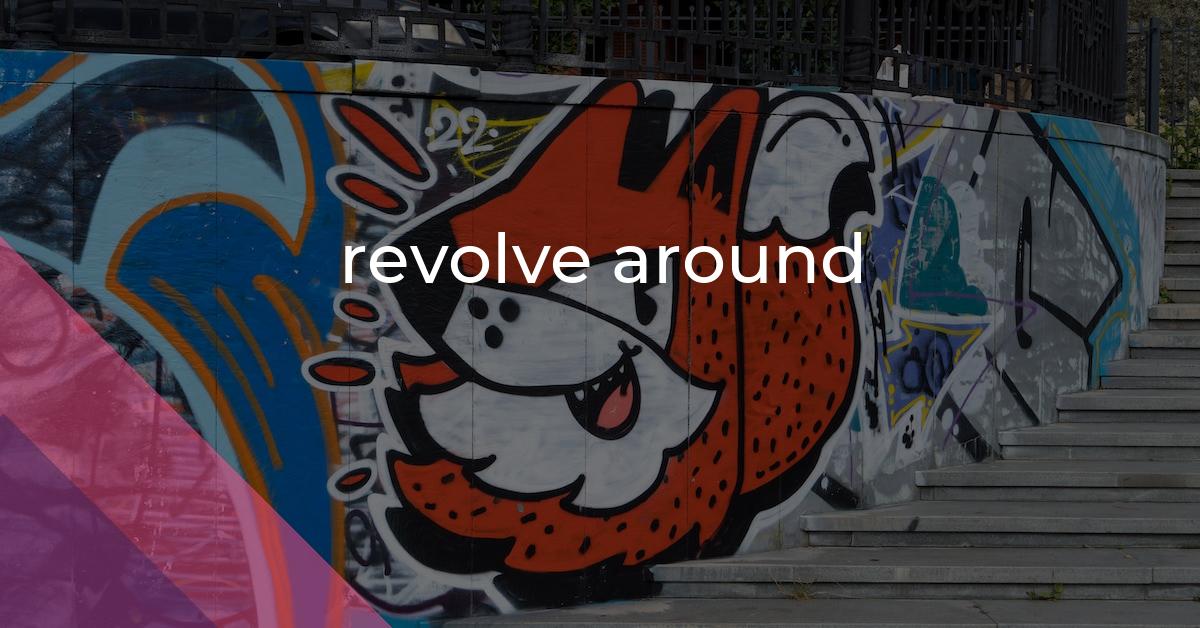revolve around: Idiom Meaning and Origin
What does ‘revolve around’ mean?
The idiom "revolve around" means to be focused or centered on a particular thing or person, where everything else is influenced or determined by it.

Idiom Explorer
The idiom "run rings around" means to easily outperform or outdo someone in a given activity or task. It implies being much more skilled or efficient than the person or group being compared to. The phrase originates from the idea of running in circles around someone or something, suggesting a clear superiority.
The idiom "run around after" means to constantly be busy or occupied attending to someone or something. It suggests a sense of being constantly on the move or dealing with various tasks and responsibilities.
The idiom "run about" means to move or travel quickly and randomly in different directions.
The idiom "rub off on" means to influence or have an impact on someone, typically in terms of their behavior, attitude, or habits.
The idiom *round up* means to gather or collect people or things together, usually for a specific purpose or to ensure everyone is accounted for.
The idiom "round the bend" means to go crazy or become mentally unstable.
The idiom "rough around the edges" means that someone or something may appear imperfect or unrefined, but still has potential or qualities that make them interesting or valuable.
Decoding Essence of "Revolve Around"
First used in the early 17th century, the idiom "revolve around" is at the heart of the English language. It has evolved over time to convey the idea of a central focus or core element. The idiom, which is thought to have originated from the concept of celestial bodies revolving around a central point, has taken on a figurative meaning in everyday conversations.
One widely accepted interpretation of "revolve around" is that it suggests a sense of dependency or reliance on a central theme. Put simply, it means that the success, importance, or relevance of something is directly determined by a particular subject or issue. This idiomatic expression has been used in various contexts. Whether we are discussing movies, literature, scientific theories, or interpersonal relationships, "revolve around" is a powerful phrase that captures the essence of dependence.
When it comes to the arts, "revolve around" is often employed to describe how a particular work of art or literary piece is centered around a specific theme or concept. For instance, a film may be said to "revolve around" themes of love, while a novel may "revolve around" the concept of identity. This usage conveys that the central theme serves as the guiding force behind the creative work, providing the pivot around which the entire piece revolves.
In the scientific realm, "revolve around" is utilized to illustrate the central idea or principle upon which a theory or hypothesis is built. It suggests that all other elements and aspects are subordinate and contribute to the core concept. In this way, the idiom emphasizes that the central theme is the focal point around which other ideas orbit and revolve, much like celestial bodies revolving around a sun. The idiom "make the world go around" is related to this, as it conveys a similar idea of a central force that drives everything else.
Additionally, when analyzing interpersonal relationships, the idiom is used to emphasize that one person's actions or decisions are influenced by another individual or group. It implies a dependence on external factors and highlights the significance of these factors in shaping one's behavior. In a sense, one person may "rally around" another, showing support and solidarity. This related idiom signifies the act of coming together, just as celestial bodies rally around a central point due to the force of gravity.
While "revolve around" has gained widespread usage and acceptance, it is essential to note that idiomatic expressions can vary in meaning and usage depending on the context. Therefore, it is crucial to consider the specific context in which the idiom is employed to fully understand the intended meaning.
As an idiom centered around the concept of revolving, "revolve around" captures the essence of a circular motion and the repetition of events or ideas. It conveys a sense of continuity and consistency, suggesting that certain elements continuously influence and shape the subject at hand. However, this idiom also acknowledges the potential for change and evolution, as the act of revolving inherently implies movement and progression. It is through this continuous movement that ideas and concepts can develop, expand, and adapt.
Overall, "revolve around" is a versatile and widely used idiom that offers a concise and impactful way to express the centrality and dependency on a specific theme or issue. It reflects the ongoing nature of human experiences and highlights the essential role that key elements play in shaping our actions, decisions, and understanding of the world. Truly, the world does "revolve around" certain ideas and themes, just as celestial bodies revolve around a central point. It is through this revolving motion that our lives take shape, and it is through our understanding of this idiom that we can better comprehend the intricacies of our language and culture.
Example usage
Examples of how the idiom revolve around can be used in a sentence:
- Her life seems to revolve around her work. (The central focus of her life is her work.)
- The team's success revolves around their star player. (The success of the team largely depends on their star player.)
- The story revolves around a young detective solving a mysterious case. (The main plot of the story centers around a young detective and their investigation.)
More "Abstract" idioms
We missed the mark - nothing found.



